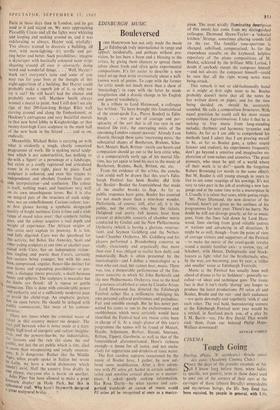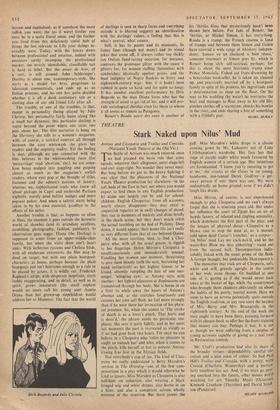Mr. Croft's production had also its share of the broader
virtues dependability, careful elo- cution and a nice sense of colour. So had Paul Hill's Troilus and Cressida, with a pretty, wittY Cressid (Charlotte Womersley) and a 'particu- larly excellent last act. And, if we must go peer- ing unasked into the future, other names worth watching for are Timothy Meats (Octavius)' Kenneth Cranham (Thyrsites) and David Stock- ton (Pandarus).
HILARY SPIIRLINO
T11AT Miss Mary McCarthy's recent critique of Mr. Osborne's new play, A Patriot for Me, not only produced an angry reply from
Mr. Tynan, but—so it is reported—a strong response from the playwright himself (no sluggard he as a critic of our life and times) only rein- forces our conception of Miss McCarthy as one of the most incisive commentators now writing in the language. For years now she has been variously described as brilliant, bitchy, Clever, heartless; is she the smiler with the knife, or the Madame de Sta61 of the English-speaking world, destroyer or creator? Her travel books on, Venice and Florence are highly regarded, her Memories of a Catholic Girlhood is one of the most honest (and amusing) autobiographies of our time, and her knowledge of art, drama, Politics and history is apparently authoritative. She is equally at home expounding the intricacies of the dialectical in-fighting between Manhattan's,
Marxists during the late 1930s or leading i task- force of intellectuals on some prestigious,
unnecessary, cultural jamboree of the 1960s. She effortlessly expounds the problems raised by both Stalinism and William Burroughs, but the tone of the ensuing discussion is sometimes such that, with the cry of Mary.McCarthyism, some literati leap to take the Fifth at opening stages of the hearings.
Yet, rightly, her reputation is founded on her novels, where her qualities of wit, observation, insight and intelligence are seen at their most im- pressive: The most recent demonstration of her creative qualities is, of course, The Group, but
in spite of the book's amazingly authoritative --and frank--dissection of the Vassar Class of '33, there still seems no central drive in the novel Which synthesises the immense range of experi- ence explored. In much the same way in A
Charmed Life, where the folksy, artistic community of New Leeds was given the full McCarthy treatment, interest almost inevitably moves away from the full-scale characterisation of Martha Sinnott, who returns to the village With her second husband, to the crazily-permis- sive values of New Leeds. As Martha dies in the wreckage of her car, she realises her mistake is that she kept to the right side . . . 'in New Leeds, after sundown, she would have been safer on the wrong side of the road. . . It's not Martha Sinnott we remember after reading the
BOOKS The Exorcism
By DAVID REES
'it would seem that the novel is of all forms the leaSt adapted to encompass the modern world, whose leading characteristic is reality. And that; so far as I can understand, is why the novel is dying.' One need not, of course, accept this possibly defeatist perspective, but certainly this view of the novel may help to explain why in her, books the central characters are necessarily enveloped in the uproar of the surrounding flux. Yet 'what is it about her first book,, The Com- pany She Keeps, originally published in 1942 and now reissued in paperback,* that makes it seem her most satisfying novel?
her is either a person of frustrated sensibility or a socialist manque . . . 'she knew, just as the analyst knows, just as the Marxist knows, that, somewhere in his character there was the need of !dense and the humility that would accept aid . 2 But, alas, when the lovers reach Sacramento, he tells her that if he were only ten years younger he'd never let her get off the train, and back East he sends her several pieces of glainour-girl underwear, a topaz brooch; and, later, a duck he had shot in Virginia, which stays in her icebox so long that the neighbours com- plain of the smell. . . .































 Previous page
Previous page